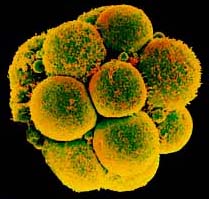
Because stem cells deal directly with the creation of human cellular matter, the potential of them is really limitless. Also, as a proxy for research, a great deal can be learned about the most basic functions of life through stem cells. For example, the root causes of birth defects have eluded scientists for years, and already embryonic stem cells are providing insight into prenatal development, perhaps in the future contributing to research that will correct or prevent birth defects. Another practical use where stem cells are proxies for other applications is in cancer research; one innovative use of stem cells designates them as vehicles for delivering genes to mutated cells. This application would be especially useful in light of new advances in gene therapy, which allow scientists to manually trigger apoptosis - self-destruction - in cancerous cells.
Despite the numerous benefits apparent in stem cell research, there is some concern among certain groups that the ends do not justify the means. Opponents of stem cell research battle daily with proponents of the research. Supporters stand fast in their belief that research in this field will bring new hope for those suffering from terminal diseases. While medicine has advanced enough to allow for diseased organs to be replaced by those of a donor, organs and donors are in short supply. Stem cells can alleviate this problem by providing the means to regenerate specialized tissues as needed. Such technology would have many real applications: diabetes could be treated through implanted pancreatic cells; Parkinson's disease and Alzheimer's disease could be treated by the replacement of dysfunctional neural tissues. Even heart diseases, a condition disturbingly common in America, could possibly be treated through the use of stem cells. Once implantation techniques have been developed, damaged heart muscle cells can be replaced by newly grown ones, reducing the risk of myocardial infarction and congestive heart failure.
Other chronic disorders in which stem cell research can have profound effect include a number of autoimmune disorders. In such diseases, such as multiple sclerosis and lupus, the body's immune system misidentifies its own cells as foreign and attacks them, destroying essential parts of the organ system. With advanced stem cell technology, scientists could potentially fabricate new immune systems for patients suffering from such afflictions. Such use of the research could have significant results in treating these disorders. More universally, stem cell creations could be used as test subjects for experimental drugs. While most drugs are currently tested on animals, because of differences in physiology results in tests are not necessarily reflective of human symptoms. Stem cells and their derivatives will likely be used to develop lines of specialized liver cells, which could be used to ascertain the detoxifying capabilities of drugs and also act as a tool in accelerated projections of long term drug effects.
Outside of humans, there are other sources of exploration in the possibilities for stem cell research. Just recently, a group of scientists at biotech company Advanced Cell Technology announced that they had managed to clone kidneys from cow stem cells. If this discovery is confirmed by peer-evaluation, it could open up a whole new field in agricultural research. Such technology would enable agriculturists to clone their best milk producing and meat-giving cattle, eliminating the time-taking trail and error breeding methods. Such practice can also be transferred to poultry farming, where the establishment of genetically modified, cloned chickens will help increase productivity of the hens as well as their resistance to disease. Previous agricultural revolutions have enabled three percent of the American population to feed the entire United States; such innovative new techniques would make that number even smaller, and ideally be a large step in eliminating hunger throughout the world.

